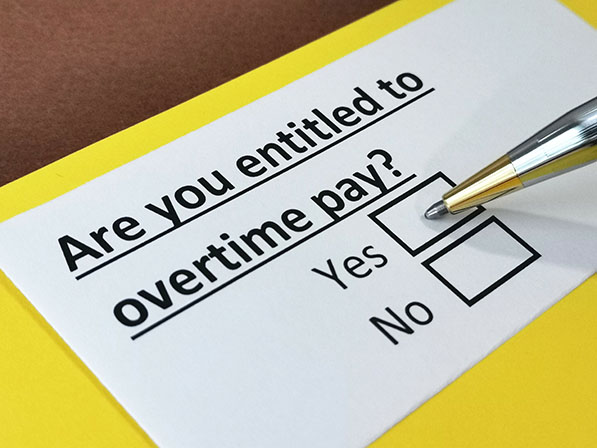Tasked with implementing and enforcing the federal Fair Labor Standards Act (FLSA), the U.S. Department of Labor (DOL) recently announced its final rule expanding overtime eligibility by establishing a new weekly salary threshold for exempt employees. Employers must meet these salary thresholds to maintain an employee’s administrative, executive or professional exemption — colloquially known as the “white-collar” exemptions — from minimum wage and overtime rules under the FLSA. The salary threshold for exempt employees under the “highly compensated” exemption also increases. The DOL’s new overtime rule will be published on April 26, 2024, and is effective July 1, 2024. California employers may not be affected though.
Under the FLSA, an employer may classify an employee as exempt from FLSA minimum wage and overtime rules through the white-collar exemptions if they meet both a job duties test and are provided a minimum weekly salary that is a predetermined and fixed amount not subject to reductions due to variations in the quality or quantity of work performed. Last increased in 2019, the current white-collar salary threshold is $684 per week (equivalent to $35,568 per year).
The DOL’s new overtime rule would increase the minimum white-collar exemptions salary over the next year to:
- Effective July 1, 2024, $844 per week (equivalent to $43,888 per year); and
- Effective January 1, 2025, $1,128 per week (equivalent to $58,656 per year).
Unlike recent prior increases that were one-time only, this new rule includes a mechanism that will trigger automatic increases on July 1, 2027, and every three years thereafter based on the methodology in effect at the time.
Additionally, as mentioned above, a “highly compensated” exemption under the FLSA is separate from the white-collar exemptions. Currently, to classify an employee using this exemption, the employer must show that:
- The employee earns a total annual compensation of $107,432 or more with at least $684 per week paid on a salary basis;
- The employee’s primary duty is office or other non-manual work; and
- The employee customarily and regularly performs at least one of the exempt duties found in the three white collar exemptions.
The DOL’s new overtime rule for this exemption is similar to the white-collar exemptions. The highly compensated salary threshold will increase over the next year to:
- Effective July 1, 2024, $132,964 per year, including at least $844 per week paid on a salary basis; and
- Effective January 1, 2015, $151,164 per year, including at least $1,128 per week paid on a salary basis.
The highly compensated salary threshold will also automatically increase on July 1, 2027, and every three years thereafter based on the methodology in effect at the time.
These salary threshold increases are substantial, and employers who must follow the FLSA exemptions standards should begin to prepare.
For California employers, however, the FLSA rules carry little meaning because California’s white-collar exemption salary threshold is different, plus California does not permit an employer to classify an employee as exempt under the “highly compensated” employee standard.
California employers should continue to apply California’s exempt employee standard, which requires employers to pay two times the current applicable statewide minimum wage. The current white-collar exemption salary threshold is $66,560 per year — substantially higher than either the current or proposed FLSA salary threshold.
Also, because the California minimum wage increases by law every January 1, the white-collar exemption salary threshold increases every year.
Interestingly, the new DOL overtime rule uses a similar methodology to the one used in a 2016 DOL final rule that aimed to increase salary thresholds for exempt employees. This rule was challenged in court and, ultimately, never took effect. This new rule will possibly experience legal challenges as well, so employers who must follow the FLSA should continue to monitor HRWatchdog for new developments as the July 1 effective date approaches.
Matthew J. Roberts, Associate General Counsel, Labor and Employment
CalChamber members can read more about Determining Exempt and Nonexempt Employee Status in the HR Library. Not a member? Learn how to power your business with a CalChamber membership.

